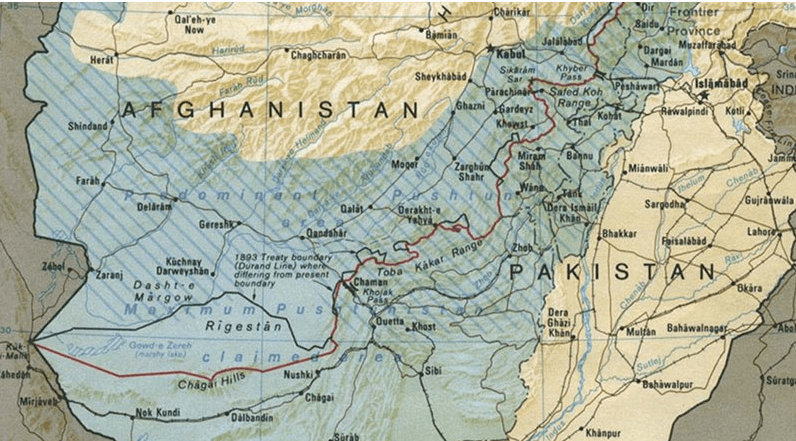At the Durand Line, Shadow Wars: Revealing the Danger

The unchecked rise of cross-border terrorism emanating from Afghanistan has become a pressing concern for Pakistan and the broader region. Recent incidents along the Durand Line, including armed incursions, improvised explosive device (IED) attacks, and the kidnapping of Pakistani security forces, expose the Taliban’s glaring failure to maintain control over Afghan territory. These developments not only undermine regional stability but also signal the dangerous potential of Afghanistan becoming a hub for extremism once again.
In this context, the statement from US State Department spokesman Matthew Miller, acknowledging the threat posed by terror bases in Afghanistan, is a significant endorsement of Pakistan’s long-standing concerns. For years, Islamabad has warned the international community about the operational capacity of militant groups thriving under the Taliban’s watch. The US’s recognition of this issue affirms the validity of these concerns and dismantles the illusion that Pakistan’s warnings were overstated.
The Taliban’s takeover in August 2021 came with promises of peace and stability, but the reality on the ground tells a starkly different story. The resurgence of groups like Tehreek-e-Taliban Pakistan (TTP) and the Islamic State Khorasan Province (ISKP) has cast a long shadow over Afghanistan’s purported stability. Despite repeated assurances, the Taliban’s inability to neutralize these factions exposes critical vulnerabilities in their governance model.
The rise in militant activity near the Durand Line underscores the Taliban’s inability—or unwillingness—to confront extremist elements. These groups not only pose a direct threat to Pakistan but also jeopardize the security of Central and South Asia. The Taliban’s continued denial of these realities reflects a dangerous delusion that risks escalating into larger conflicts if left unaddressed.
Recent incidents along the Durand Line highlight the operational prowess of militant networks operating in Afghanistan. Cross-border attacks, kidnappings, and explosions are not isolated events; they are part of a larger strategy to destabilize Pakistan and exploit the porous border for terror activities. These incidents debunk the Taliban’s claims of maintaining complete control and reveal a governance vacuum that militant groups are exploiting with impunity. The implications of such activities extend far beyond Pakistan. The Durand Line is a critical artery for trade, diplomacy, and security in the region. Its destabilization has the potential to disrupt vital economic corridors and worsen already tense relations between regional powers. Afghanistan’s inability to address cross-border threats has transformed the Durand Line into a volatile flashpoint, endangering both regional and international interests.
The evolving collaboration between the US and Pakistan to address cross-border terrorism represents a crucial step in the fight against extremism. Both nations have a shared interest in dismantling terror networks that threaten stability in South Asia and beyond. This partnership reflects a recognition of the seriousness of the issue and the need for a coordinated response.
For Pakistan, this collaboration is not just about security—it is about survival. As a frontline state, Pakistan has borne the brunt of terrorism for decades, making its counter-terrorism efforts a matter of national importance. The US’s acknowledgment of these challenges reinforces Pakistan’s role as a key player in regional security and highlights the importance of its contributions to global counter-terrorism initiatives.
The unchecked growth of militant networks in Afghanistan poses systemic risks to the entire region. Beyond the immediate threat of terrorism, these groups could disrupt critical infrastructure, destabilize governments, and exacerbate existing geopolitical rivalries. The consequences of inaction are dire: a region plagued by violence, economic stagnation, and political instability. The international community must recognize the gravity of these threats and act accordingly. This includes pressuring the Taliban to take decisive action against extremist groups and providing support to countries like Pakistan that are on the frontlines of this fight. Ignoring these risks will only embolden militant networks and create new challenges for global peace and security.
Addressing the threats posed by Afghanistan’s terror networks requires a multi-faceted approach. Military action alone cannot solve the problem. Instead, it must be complemented by diplomatic engagement, economic development, and efforts to address the root causes of extremism. For Pakistan, this means maintaining a delicate balance between counter-terrorism operations and constructive engagement with Afghan leadership. While military action is necessary to neutralize immediate threats, long-term stability will require fostering cross-border development projects, promoting inclusive governance, and ensuring that Afghanistan does not revert to being a global hotspot for terrorism.
The threat posed by cross-border terrorism from Afghanistan is neither an isolated issue nor a hypothetical concern—it is a pressing reality with far-reaching implications. The acknowledgment of this threat by the US marks a critical turning point, validating Pakistan’s concerns and highlighting the need for urgent, coordinated action.
As Afghanistan’s instability continues to ripple across the region, Pakistan’s role as a stabilizing force becomes increasingly vital. By fostering collaboration with international partners and addressing the root causes of extremism, the region can work toward a more secure and peaceful future. However, the success of these efforts will depend on the international community’s willingness to confront the realities of Afghanistan’s governance challenges and take decisive action.






